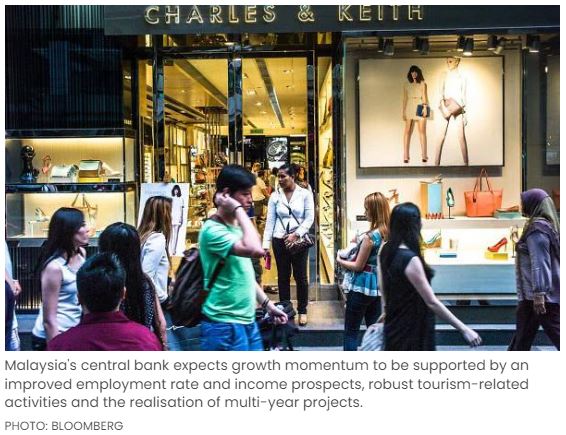Malaysia hikes key rate to 2.5%, says not on pre-set tightening path
MALAYSIA’S central bank raised the key overnight policy rate (OPR) by 25 basis points to 2.5 per cent on Thursday (Aug 8) in a widely-expected move, while noting that growth momentum is expected to continue.
Bank Negara Malaysia emphasised that the monetary policy committee is not on any pre-set course and will continue to assess evolving conditions and their implications for the overall outlook for domestic inflation and growth.
“Any adjustments to the monetary policy settings going forward would be done in a measured and gradual manner, ensuring that monetary policy remains accommodative to support a sustainable economic growth in an environment of price stability,” said the central bank.
Koong Lin Loong, chairman of the finance and planning committee in The Associated Chinese Chambers of Commerce and Industry of Malaysia, expressed concerns about the cost pressures faced by over 1.15 million small and medium enterprises (SMEs) in the country.
“The interest rate hike is a double-edged sword. On one hand, it could tame the soaring inflation but at the same time, it could also add pressure to the SMEs which are struggling with cash flow and rising material costs,” he told The Business Times.
Many SMEs have exhausted their reserves in the past 2 years and are struggling to repay loans, and this third rate hike this year is making things worse, he added.
This is the first time since 2010 that the OPR has been raised in 3 consecutive meetings. Prior to these hikes, the OPR had been at a record low of 1.75 per cent since July 2020.
At its fifth monetary policy meeting of the year, Bank Negara said that the move was taken in view of the country’s growth prospects remaining intact. It expects momentum to be supported by an improved employment rate and income prospects; robust tourism-related activities; and the realisation of multi-year projects.
Sunway University economics professor Yeah Kim Leng said Bank Negara’s move signals its confidence in the country’s economic growth: “Many were confused (as to) why Bank Negara increased the rate now, as this will increase the cost of doing business. However, the idea of raising interest rates is to ensure a balance between economic growth and inflation, to reduce high inflation rate caused by demand pressures.”
The latest hike had been anticipated by 19 out of 20 economists in a Reuters poll, with the remaining economist having expected a hike of 50 basis points.
For the next monetary policy meeting in November, 16 of the 20 polled expect another 25 basis-point hike, which would bring the OPR to 2.75 per cent.
Bank Negara noted that the global economy continues to expand but at a slower pace, weighed down by rising cost pressures, tighter global financial conditions and strict Covid-19 containment measures in China.
“Aggressive adjustments in US interest rates have contributed to a strong US dollar environment. This has resulted in higher volatility in financial markets, affecting other major and emerging market currencies, including the ringgit,” said the central bank.
The Malaysian ringgit tumbled to a 24-year low at RM4.5015 against the US dollar on Sep 7, the weakest since January 1998. Year-to-date, the ringgit has depreciated 7.8 per cent from RM4.1763 at the start of the year.
Bank Negara expects inflation to peak in the third quarter this year before moderating thereafter, due to dissipating base effects and in line with an expected easing of global commodity prices. Year-to-date, Malaysia’s headline inflation has averaged 2.8 per cent.
In the rest of the year, underlying or core inflation is expected to average closer to the upper end of the central bank’s target range of 2 to 3 per cent, with some signs of demand-driven pressures amid a high-cost environment.
“The extent of upward pressures to inflation will remain partly contained by existing price controls, fuel subsidies and the prevailing spare capacity in the economy,” said Bank Negara.
In July, Malaysia’s core inflation was 3.4 per cent, while headline inflation accelerated to 4.4 per cent year-on-year. Oxford Economics senior economist Alex Holmes expects headline inflation to rise further and peak at just below 5 per cent in the next few months, due to increasing prices of service and tourism-related items.
Despite this, the pace of policy normalisation should remain gradual as global headwinds might slow the growth momentum, he said in a Sep 8 research note: “We expect just one more 25 basis points rate hike this year in November, before Bank Negara leaves the policy rate on hold throughout 2023 at 2.75 per cent, slightly below its pre-pandemic level.”
Source: https://www.businesstimes.com.sg/asean-business/malaysia-hikes-key-rate-to-25-says-not-on-pre-set-tightening-path


 English
English




